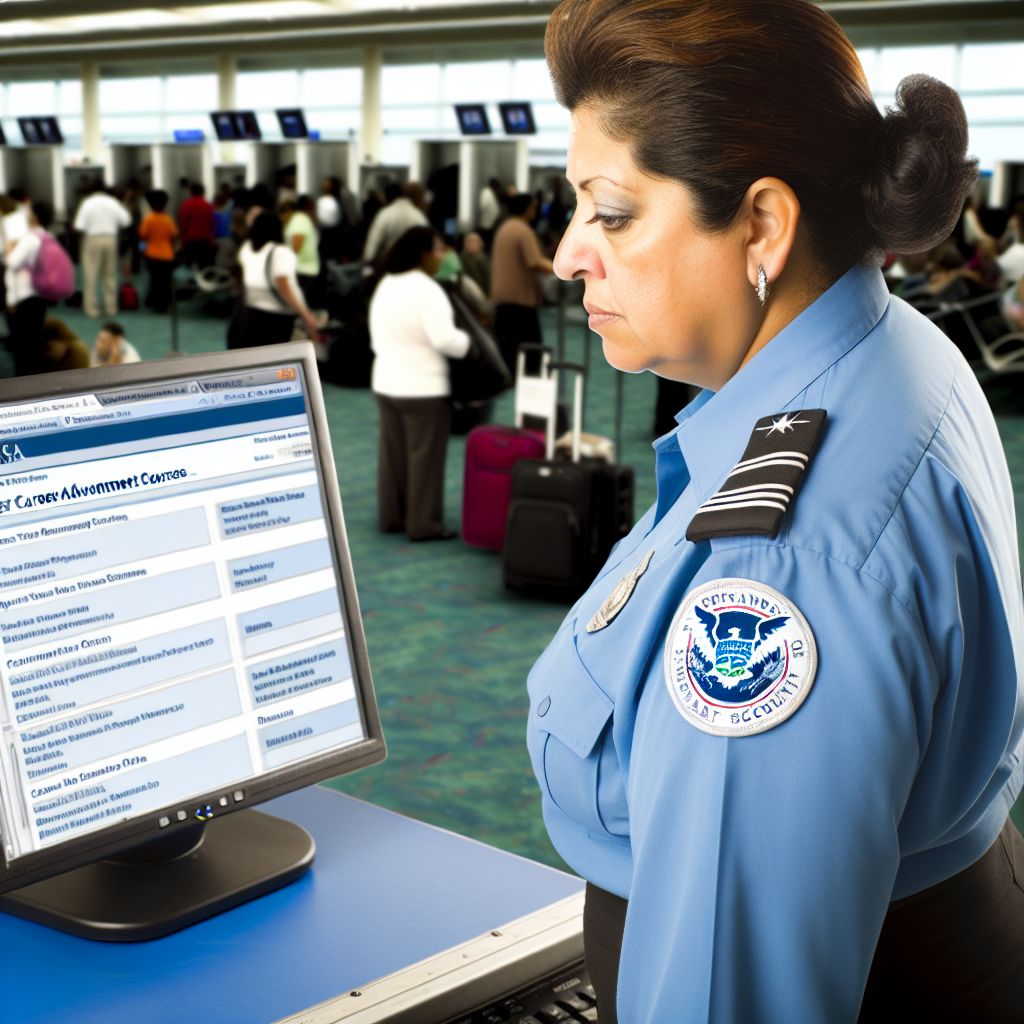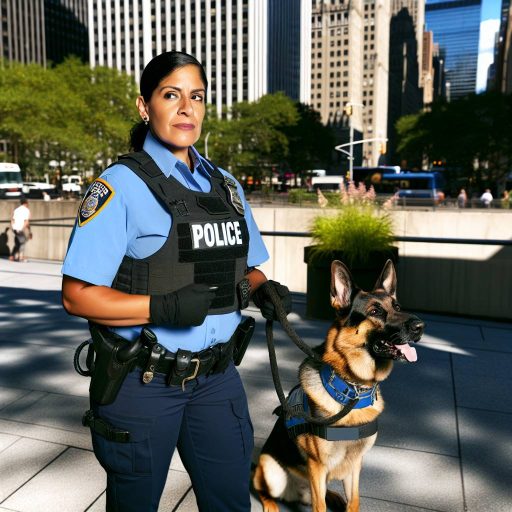Introduction:
The TSA (Transportation Security Administration) plays a crucial role in ensuring airport security.
TSA officers are instrumental in maintaining safe travel and have various career paths within the organization.
Advancement Opportunities for TSA Officers:
- Supervisory Roles: TSA officers can advance to become supervisors, overseeing daily operations and staff.
- Specialized Units: Officers can join specialized units such as canine teams, explosives detection, or behavior detection.
- Training and Development: TSA offers training programs to enhance officers’ skills and qualify for higher positions.
- Management Positions: Experienced officers can move into management roles, leading teams and making strategic decisions.
- Executive Level: Top-performing officers have the opportunity to reach executive positions within the TSA.
- Advanced Technology: Officers can work with cutting-edge security technology, contributing to innovation in the field.
- Policy and Regulations: Some officers may transition into roles focusing on policy development and regulatory compliance.
- Collaborative Projects: TSA officers often collaborate with other agencies and international partners on security initiatives.
- Public Affairs: Officers with strong communication skills may pursue roles in public affairs, representing the TSA to the public.
- Research and Development: Officers can engage in research projects to improve security procedures and protocols.
TSA officers have a wide range of opportunities for advancement, allowing them to grow professionally and contribute to the safety of travelers worldwide.
Overview of TSA Officer Position:
Working as a Transportation Security Administration (TSA) officer is a vital role in ensuring the safety and security of travelers at airports across the country.
TSA officers are responsible for screening passengers and luggage, operating various security equipment, and enforcing security regulations to prevent potential threats.
- Responsibilities include screening passengers and luggage.
- Operating security equipment and enforcing regulations.
- Requirements: background checks, physical fitness tests, training programs.
Duties and Responsibilities of a TSA Officer
One of the primary duties of a TSA officer is to screen passengers at security checkpoints.
This involves using x-ray machines and metal detectors to ensure that no prohibited items are brought onto an aircraft.
Additionally, TSA officers are responsible for screening luggage to detect any potential threats or dangerous items.
Another key responsibility of a TSA officer is operating security equipment, such as body scanners and explosive trace detection machines.
These tools help officers identify any suspicious items that may pose a threat to aviation security.
Officers must be proficient in using this equipment to effectively perform their job duties.
Enforcing security regulations is also a critical aspect of a TSA officer’s role.
Officers must ensure that passengers comply with security protocols, such as removing shoes and electronics during screening.
They also have the authority to conduct thorough searches if necessary to maintain the safety of the traveling public.
Requirements for Becoming a TSA Officer
Before becoming a TSA officer, candidates must meet certain requirements to ensure they are qualified for the role.
These requirements typically include undergoing background checks to verify a candidate’s criminal history and eligibility to work in a security-sensitive position.
In addition to background checks, candidates must also pass physical fitness tests to demonstrate they are capable of performing the physical demands of the job.
TSA officers may need to stand for long periods, lift heavy objects, and respond quickly in emergency situations, so physical fitness is essential for success in this role.
Training programs are also required for aspiring TSA officers to prepare them for the responsibilities of the job.
These programs cover a variety of topics, including security procedures, threat detection techniques, and customer service skills.
Transform Your Career Today
Unlock a personalized career strategy that drives real results. Get tailored advice and a roadmap designed just for you.
Start NowCompletion of a training program is necessary before candidates can officially become TSA officers.
Entry-Level Opportunities:
As a TSA officer, you can expect to start with a competitive salary, typically ranging from $30,000 to $40,000 per year.
In addition to the base salary, TSA officers also receive benefits such as health insurance, retirement plans, and paid time off.
While starting as an entry-level TSA officer, there is significant potential for career advancement within the organization.
With dedication, hard work, and a commitment to excellence, officers can progress to higher-level positions with increased responsibilities and higher pay.
Building experience and skills as an entry-level officer is crucial for long-term career growth.
By mastering the tasks and responsibilities of the job, officers can demonstrate their capabilities and readiness for more challenging roles within the TSA.
- Starting Salary and Benefits
- Potential for Career Growth
- Importance of Gaining Experience
You Might Also Like: Emergency Management Director: Developing Leadership Skills
Specialized Training and Certifications
Explore the different training programs available for TSA officers.
Such programs include explosives detection training.
Behavior detection training is also a crucial certification that officers can pursue.
Obtaining specialized training enhances job performance significantly.
Specialized training and certifications play a key role in the career path of TSA officers.
These programs provide officers with the necessary skills to carry out their duties effectively.
Additionally, they open up opportunities for career advancement within the organization.
Explosives Detection Training
One of the most important training programs available to TSA officers is explosives detection training.
This specialized training equips officers with the tools to identify potential threats.
By completing explosives detection training, officers demonstrate commitment to safety.
This certification enhances job performance and increases the likelihood of advancement.
Behavior Detection Training
Another valuable certification is behavior detection training for TSA officers.
Transform Your Career Today
Unlock a personalized career strategy that drives real results. Get tailored advice and a roadmap designed just for you.
Start NowThis program teaches officers to recognize suspicious behavior patterns.
Obtaining behavior detection training significantly improves risk assessment abilities.
By honing skills in identifying threats, officers increase their value to the organization.
Additionally, this positions them for career growth opportunities.
Specialized training and certifications are essential components of a TSA officer’s career path.
By pursuing these programs, officers can enhance their skills and improve job performance.
This ultimately positions them for advancement within the organization.
You Might Also Like: Parole Officer: Fieldwork vs. Office Work
Supervisor and Management Roles:
Advancing to supervisory and management roles within the Transportation Security Administration (TSA) offers TSA officers the opportunity for career growth and increased responsibilities.
Here is a breakdown of the career path for TSA officers to move into leadership positions:
Lead Officer:
- Lead officers are typically experienced TSA officers who have shown leadership potential.
- They oversee a team of officers, assist with training, and ensure security protocols are followed.
- Responsibilities include supervising daily operations, addressing team issues, and reporting to higher management.
- Qualifications for a lead officer position may include a certain number of years of experience and demonstrated leadership skills.
Assistant Manager:
- Assistant managers in the TSA are responsible for overseeing a larger team of officers and lead officers.
- They assist in strategic planning, resource allocation, and day-to-day decision-making.
- Qualifications for an assistant manager role often include a bachelor’s degree and relevant management experience.
- Assistant managers work closely with airport security managers to ensure smooth operations.
Airport Security Manager:
- Airport security managers are in charge of an entire airport’s security operations, including TSA checkpoints and staff.
- They develop security protocols, manage budgets, and coordinate with airport authorities and law enforcement.
- Qualifications for this top-tier role typically include a bachelor’s or master’s degree in a related field.
- Benefits of becoming an airport security manager include higher salary, greater influence, and career prestige.
Moving into a supervisory or management role within the TSA comes with a range of benefits and opportunities for professional development.
Beyond the increased responsibilities and leadership opportunities, individuals in these positions often enjoy greater job stability, competitive salaries, and access to advanced training and development programs.
Explore Further: Women in State Trooper Roles: Breaking Barriers

Specialized Units and Task Forces:
Opportunities exist for TSA officers to join specialized units and task forces like the Federal Air Marshal Service or the Canine Explosive Detection Program.
These roles often require specific training and qualifications to ensure officers are prepared for the unique demands of these units.
- Opportunities exist for TSA officers to join specialized units and task forces like the Federal Air Marshal Service or the Canine Explosive Detection Program.
- These roles often require specific training and qualifications to ensure officers are prepared for the unique demands of these units.
See Related Content: Top Tools Used by Bomb Squad Technicians
Education and Training Opportunities:
Continuing education and training are crucial for TSA officers seeking career advancement.
Keeping up with the latest techniques and technology in airport security is essential for staying competitive in the field.
By participating in ongoing training programs, officers can enhance their skills, expand their knowledge base, and demonstrate their commitment to professional development.
Importance of Continuing Education:
- Remain up-to-date on evolving security protocols
- Enhance problem-solving abilities in high-pressure situations
- Stay informed about emerging threats and trends
These educational opportunities not only benefit the individual officer but also contribute to the overall effectiveness of the TSA in safeguarding our nation’s airports.
Transform Your Career Today
Unlock a personalized career strategy that drives real results. Get tailored advice and a roadmap designed just for you.
Start NowEducational Opportunities Available:
TSA officers have access to a variety of training resources, including online courses, workshops, and seminars.
These programs cover a range of topics related to airport security, law enforcement, and counterterrorism.
Officers can choose courses that align with their career goals and interests, allowing them to tailor their education to their specific needs.
- Online courses offer flexibility and convenience for busy officers
- Workshops provide interactive learning experiences and hands-on training
- Seminars offer networking opportunities and access to industry experts
By taking advantage of these educational opportunities, TSA officers can expand their knowledge, enhance their skills, and position themselves for future career advancement.
Benefits of Pursuing Further Education:
- Increased job opportunities within the TSA
- Potential for promotions to higher-level positions
- Enhanced job performance and job satisfaction
Furthermore, pursuing further education in fields related to airport security and law enforcement can open up new career paths and opportunities outside of the TSA.
By acquiring specialized skills and knowledge, officers can increase their value in the job market and explore a wider range of career options.
Education and training play a vital role in the career development of TSA officers.
By continuously investing in their professional growth and development, officers can position themselves for success and advancement within the field of airport security.
TSA Officer Career Path and Opportunities
The TSA officer career path offers numerous opportunities for advancement.
Individuals can progress and grow within the organization.
From entry-level positions to leadership roles, various avenues exist for career development.
It is essential for individuals interested in airport security to explore the different career paths available within the TSA.
By understanding the opportunities for advancement, individuals can tailor their career goals and aspirations accordingly.
TSA officers play a critical role in maintaining safe travel.
They protect passengers and ensure national security.
The rewarding opportunities for career growth within the organization benefit individuals and contribute to the overall safety of our nation’s airports.
Additional Resources
[E-Books for Sale]
The Big Book of 500 High-Paying Jobs in America: Unlock Your Earning Potential
$19.99 • 500 High-Paying Jobs • 330 pages
Explore 500 high-paying jobs in America and learn how to boost your career, earn more, and achieve success!
See All 500 High-Paying Jobs of this E-Book
1001 Professions Without a Degree: High-Paying American Jobs You Can Start Now
$19.99 • 1001 Professions Without a Degree • 174 pages
Discover 1001 high-paying jobs without a degree! Unlock career tips, skills, and success strategies for just $19.99!




